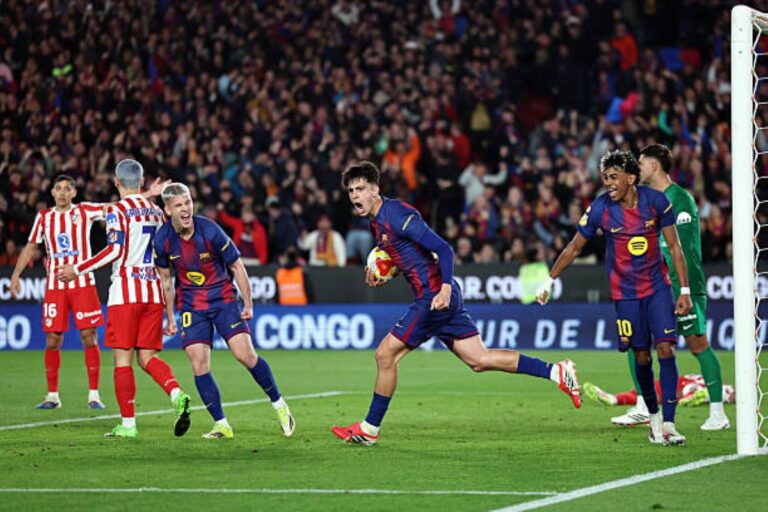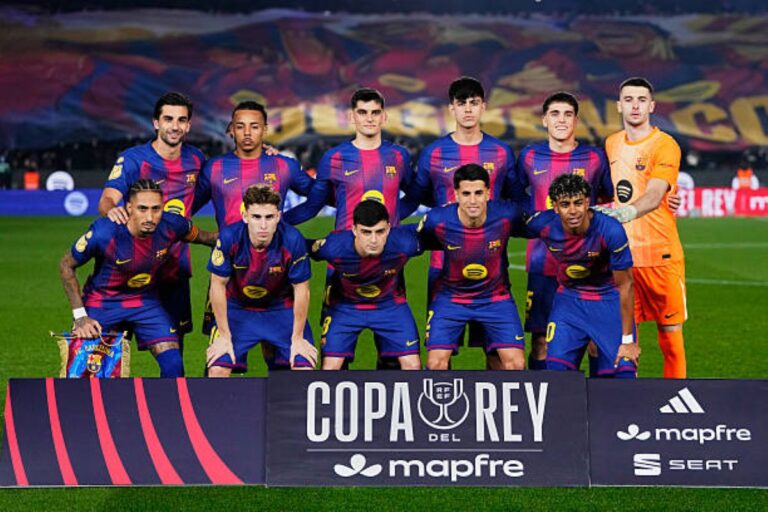Barcelona opportunity to claim a treble was dashed with a heartbreaking 3-4 loss against Inter Milan in the UEFA Champions League semifinal second leg at the San Siro, giving the Spanish side a total loss on aggregate with 6-7.
Their second-half push was valiant, and led by Hansi Flick, Barcelona could not overcome the two-goal deficit.
Following a first half down two, Barcelona answered back with a strike from Eric García, Dani Olmo, and Raphinha, igniting the hope of a magical comeback.
But Inter Milan evened the score during stoppage time by Francesco Acerbi, and then in extra time sealed the win with Davide Frattesi’s goal.
Despite the tough loss to Inter Milan, Barcelona’s resilient second-half fightback and standout performances from players like Lamine Yamal offer valuable positives to build on for future challenges.
Barcelona’s participation in the Champions League had ended.
Here are the 5 things we learned from the match:
1.Defensive Weaknesses In The Absence of Key Players:
Barcelona missed Jules Koundé and fell apart, with Eric García severely challenged by Inter’s wing-back Denzel Dumfries.
The goals scored by Lautaro Martínez have exposed Barcelona’s need for better defensive cover due to the unavailability of key defenders.
Either depth on the roster or tactical changes were needed to address the speed and overlapping runs that Inter were contributing to the attacks.
2.Over-Reliance on Lamine Yamal to Create:
While Yamal’s unpredictability was a challenge for Inter’s Federico Dimarco, Barcelona had a heavy reliance on the 17-year-old to create opportunities in the attack.
With Robert Lewandowski on the bench and Ferran Torres unable to affect the game, the rest of the group had few other attacking options.
Barcelona will need to focus on getting a more balanced offensive approach in order to ensure we count on more than just one player to get the group not only motivated to attack, but engaged in step up roles during the most important games.
3.Struggled Against a Low Block:
Inter were content to sit back in their 3-5-2 system led by Hakan Çalhanoğlu and Alessandro Bastoni to help neutralize Barcelona’s impressive possession.
As a result, the game left little for Pedri and Frenkie de Jong to affect the team’s outcome.
The ability to try and break through a low-block was not evident, which suggests that we need to improve on quicker movements, faster passing, and combine with better creativity in the final third, to penetrate tighter defences.
4.Set-Piece Problems Need to be Fixed:
Barcelona found themselves threatened by set pieces multiple times in the match, with one being Francesco Acerbi’s header which which forced a save.
Barcelona were poor in set pieces all night, typically poor at marking, and weak in the air, and were even more exposed without Koundé.
Organizing better for set pieces and, in particular, being better physically in the box, is essential to avoid conceding goals when they very much matter.
5.Clinical Finishing Makes the Difference:
Inter Milan were ruthless in their finishing with Martínez’s precise shot and Barella’s stunning curler, whereas Barcelona missed their chances, including Raphinha’s blocked shot.
The match highlighted how, in a high-stakes game, you must capitalize on the limited chances you create, and it is critical for Barcelona to be much more composed and clinical in front of the goal.
Want to get the latest Barcelona news direct to your phone? Join our WhatsApp community by clicking here.




